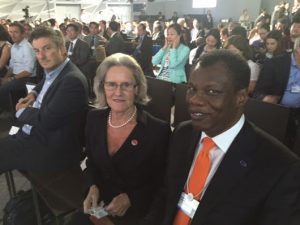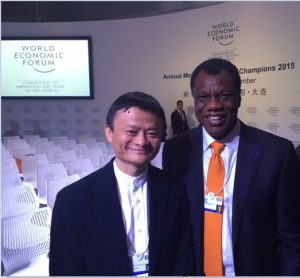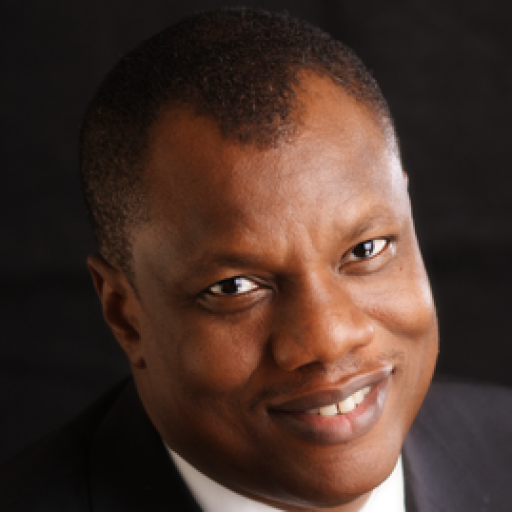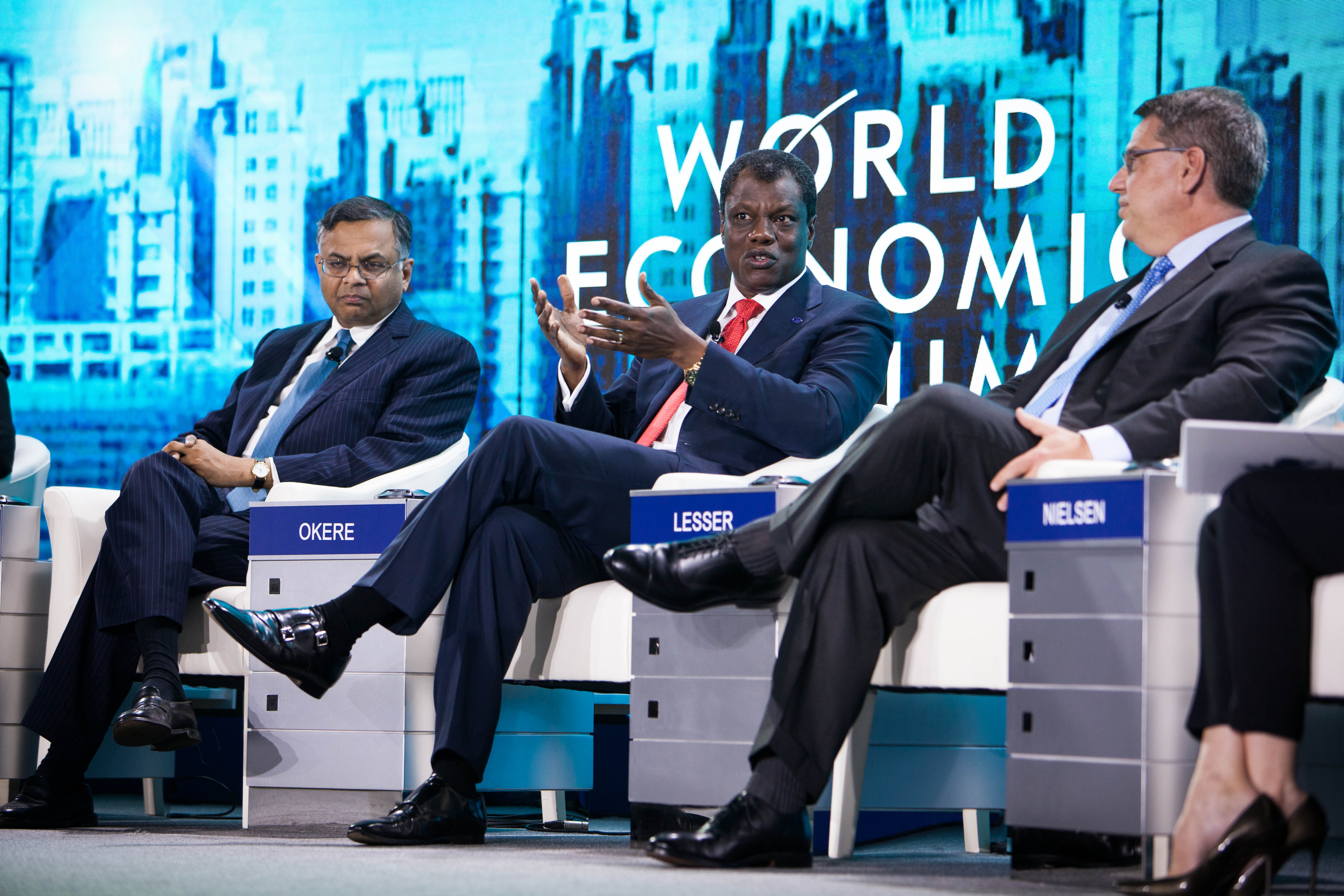Founder of CWG Plc and Entrepreneur in Residence at CBS, Austin Okere, spoke on the Digital Advantage Panel anchored by Nielsen Bronwyn of CNBC Africa at the World Economic Forum Annual Meeting of the New Champions in Tianjin, China.
The WEF Champions meeting which holds annually in China and also known as the ‘Summer Davos’, attracted over 2,000 delegates comprising global industry captains, top academia, heads of states and top government functionaries to the city of Tianjin for two days from September 10.

Hilde Schwab and Austin Okere at the strategic growth frameworks GGC & Tech Pioneers at the 2015 World Economic Forum Annual Meeting of New Champions, in China
Speaking alongside Rich Lesser, global CEO & President of the Boston Consulting Group, Natarajan Chandrasekaran, CEO of Tata Consultancy Services, Mitchell Baker, Executive Chairwoman of the Mozilla Foundation, and Maurice Levy, Chairman and CEO of the Publicis Groupe on the role of Science, Technology, Engineering and Math (STEM) education and the importance of Computer Science on future employment trends, Mr. Okere threw light on the transformative Nigeria Research and Education Network (NgREN) project which his company, CWG, collaborated with the World Bank and the Education Ministry in Nigeria to deliver earlier in the year. The project, the first of its kind in West and Central Africa, covers the 27 Premier Federal Universities in Nigeria and their over one million students and staff, providing high definition telepresence capabilities for real-time collaboration, voice over internet protocol (VOIP), shared access to research content and joint experimentation projects. Subsequent phases will extend to over 500 other Universities, Polytechnics and Colleges of Education, and cover over 20 million people.
On the question of technology and needed regulation, Austin’s view is that legislation will always lag technology regulation because of its innate manual and iterative nature and having to chase rapid innovation in technology. He believes that in the future, physical stores shall only be for brand enticement and ‘look & feel’, while most purchases shall be made online.
Mr. Okere averred that business models based on the arbitrage of information such as travel agencies shall be disrupted and disintermediated in favour of business models based on creativity and knowledge value add to information, such as software design, big data analytics and Ecommerce enablers such as Google and Alibaba. He added that in today’s world, Small and Medium Enterprises (SMEs) can have access to the hitherto technology advantage enjoyed by larger companies, by leveraging technology solutions available through cloud computing, and spreading capital costs through subscription payments. He counselled governments to invest in the critical ‘last mile’ infrastructure that enables Broadband access to homes and offices to further boost inclusive growth, noting that there is a correlation between pervasive Broadband Access and the GDP growth of a country.
When asked about financial inclusion and business expansion into emerging markets, Austin’s views were that the new frontiers for business expansion following saturation in the developed markets were Africa and Latin America. He however cautioned against wholesale importation of western business model templates into these emerging markets given the different geographies, peoples and cultures. He counsels local partnerships to explore the immense opportunities in a mutually beneficial manner.

Jack Ma, Founder & Executive Chairman, Alibaba and Austin Okere, Founder and CEO, CWG Plc at the WEF AMNC in China
On financial inclusion and the widely popular M-PESA mobile banking system in Kenya, Mr. Okere explained that the model has not quite taken off in promising markets such as Nigeria because of the model adopted in Kenya where the initiative is telecom operator led. He expressed deep scepticism about the ‘largest bank’ in the country being outside of the supervisory purview of the Central Bank, since telecom operators are rather regulated by the Communication Commission. He favours a bank led model, which is slow in taking off because the banks are just learning the ropes in agent recruitment, a critical pillar in the value chain and the forte of telecom operators.
He however, believed that the recent launch of the national identity card project in Nigeria will significantly boost financial inclusion in the country, since the cards, with biometrics and financial transaction capability (in conjunction with MasterCard), shall be carried by over 130 million Nigerians; far more than the subscribers on M-PESA, which stands at about 15 million as at June 2014.
It will be recalled that CWG was named a WEF Global growth Company in May 2014 at the WEF Forum at Abuja in recognition of her phenomenal growth, global corporate citizenship, executive leadership and impact on the competitive landscape of the ICT industry in Africa. Acknowledging the company, David Aikman, Managing Director and Head of the New Champions at the World Economic Forum, remarked that “CWG Plc is a dynamic group with clear potential to shape the future in its relevant business sector and so is a perfect fit to our GGC community”.
The Forum was opened at a colourful event by Chinese Premier Li Keqiang and Professor Schwab Klaus, Founder and Chairman of the World Economic Forum. The premier assured the international business community in China that they would not be selectively targeted in the ongoing industrial reforms in China, while announcing a healthy GDP growth of 7.6% and the creation of an additional 10.4 million jobs in the eight months to September.
Professor Schwab thanked the Government of China for their continued hospitality to the WEF community and assured of the reciprocity of the global business community through increased investment in the Country.


Recent Comments